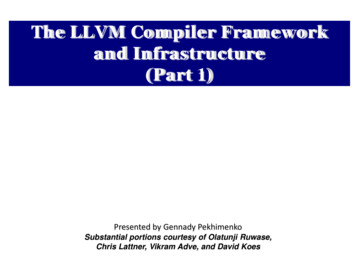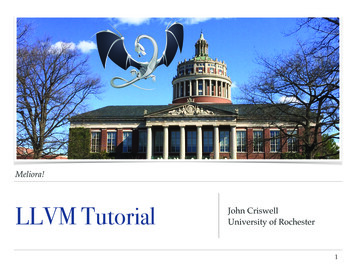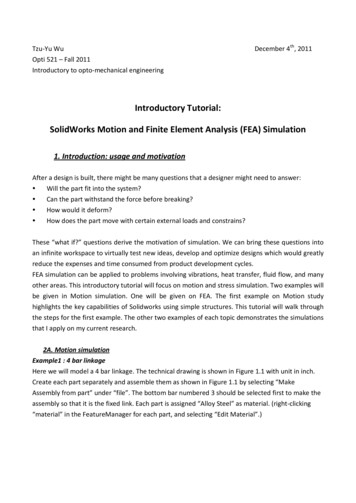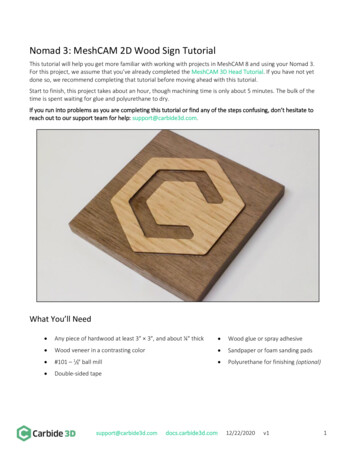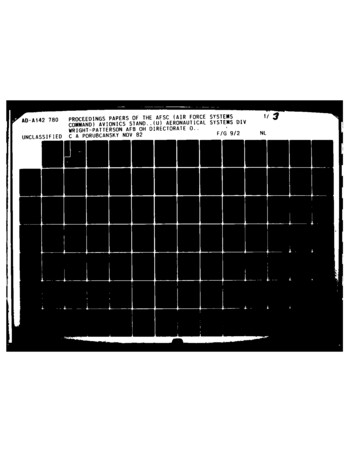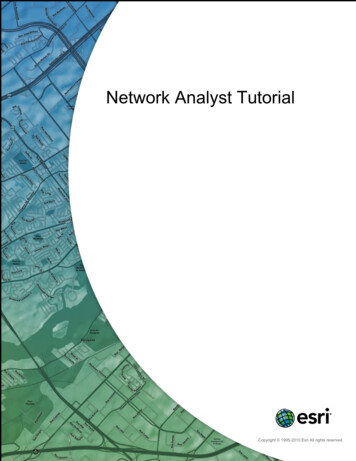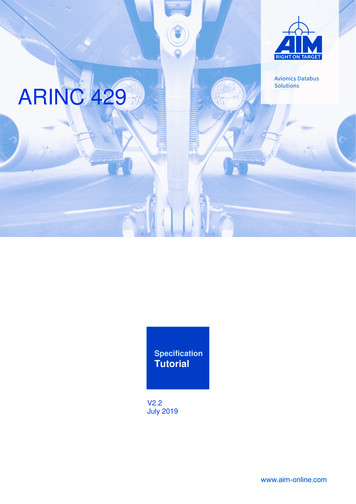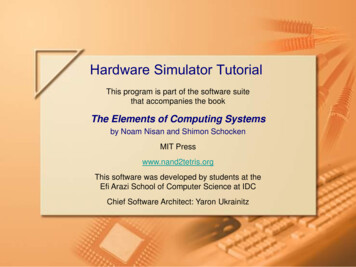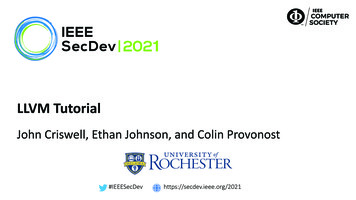
Transcription
LLVM TutorialJohn Criswell, Ethan Johnson, and Colin Provonost#IEEESecDevhttps://secdev.ieee.org/2021
LLVM TutorialJohn Criswell, Ethan Johnson, and Colin Provonost#IEEESecDevhttps://secdev.ieee.org/2021
Goals2
Today’s Goal Create LLVM pass that instruments store instructions Optimize checks on store instructions3
Programming Background C Other language bindings exist, but C is “native” Know how to use classes, pointers, and references Know how to use C iterators Know how to use Standard Template Library (STL)4
Virtual Machine v21/5
Start Your Virtual Machines! Login name: user Login password: llvm is cool Source code is in /home/user/src/SecDev6
LLVM Compiler Structure7
LLVM is a Compiler Infrastructure Set of libraries for building compiler tools Write tools to analyze software behavior Write tools that control program behavior8
Ahead of Time (AOT) CompilerFront EndOptimizerCode GeneratorClang ASTParsedSource Code TreeLLVM IRArchitectureindependent code inSSA formLLVM Machine IRNative CodeInstructions9
Ahead of Time (AOT) CompilerFront EndOptimizerCode GeneratorClang ASTParsedSource Code TreeLLVM IRArchitectureindependent code inSSA formLLVM Machine IRNative CodeInstructions9
Optimizer StructureOptimizerLLVMIRPass1LLVMIRPass2LLVMIR10
LLVMIntermediate Representation11
LLVM IR is a language into which programsare translated for analysis and transformation12
LLVM IR Forms LLVM Assembly Language LLVM Bitcode Text form saved on disk for humans to readBinary form saved on disk for programs to readLLVM In-Memory IR Data structures used for analysis and optimization13
LLVM IR Example make sh compile-testsCompile SecDev PassCompile test programs with LLVM cd run llvm-dis global.bcDisassemble and put output in global.ll14
LLVM Assembly Languagedefine dso local void @set foo(i32 %new foo) #0 {Code organized asfunctionsentry:%new foo.addr alloca i32, align 4store i32 %new foo, i32* new foo.addr, align 4, !tbaa !2%0 load i32, i32* %new foo.addr, align 4, !tbaa !2store i32 %0, i32* @foo, align 4, !tbaa !4Simple load/storeinstructionsret void}15
Overview of LLVM IR Each assembly/bitcode file is a Module Each Module is comprised of Global variables A set of Functions which are comprised of A set of basic blocks which are comprised of A set of instructions16
LLVM Bitcode FileModuleGlobal int[20];Function: foo()Function: 17
LLVM Instruction Set RISC-like architecture Virtual registers in SSA form Load instructions read from memory objects Store instructions write to memory objects All other instructions read or write virtual registers18
Instructions for Computation Arithmetic and binary operators Two’s complement arithmetic (add, sub, multiply, etc) Bit-shifting and bit-masking Pointer arithmetic (getelementptr or “GEP”) Comparison instructions (icmp, fcmp) Generates a boolean result19
Memory Access Instructions Load instruction reads memory Store instruction writes to memory Atomic compare and exchange Atomic read/modify/write20
Control Flow Instructions Terminator instructions Indicate which basic block(s) to jump tonextConditional branch, unconditionalbranch, switchReturn instruction to return to callerCall instruction calls a function addbradddivretaddsubretIt can occur in the middle of a basicblock21
Memory Allocation Instructions Stack allocation (alloca) Calls to heap-allocation functions (e.g., malloc()) Allocates memory on the stackNot a special instruction; just uses a call instructionGlobal variable declarations Not really instructions, but allocate memory All globals are pointers to memory objects22
Single Static Assignment (SSA) Each function has infinite set of virtual registers Only one instruction assigns a value to a virtual register(called the definition of the register) An instruction and the register it defines are synonymous%z add %x, %y23
Single Static Assignment (SSA) Instruction and the register it defines are synonymous%z add %x, %yBinaryOperatorName: %zOperator: addOperands: %x, %y24
Writing an LLVM Pass25
Optimizer StructureOptimizerLLVMIRPass1LLVMIRPass2LLVMIR26
Two Types of PassesPass TypeDescription Analysis Pass Transform (Optimization) Pass Does not modify programProvides information “out of band” to otherpassesModifies the programMay call analysis pass methods to get “out ofband” information27
LLVM IR Pass Types ModulePass FunctionPass BasicBlockPass I recommend ignoring “funny” passes LoopPass RegionPass28
Rules for LLVM Passes Only modify values and instructions at scope of pass ModulePass can modify anything FunctionPass should not modify anything outside ofthe function BasicBlockPass should not modify anything outside ofthe basic block29
Let’s Write a Simple Pass30
SecDev.h Examplestruct SecDev : public ModulePass {public:// Pass Identifier variablestatic char ID;// ModulePass public methodsSecDev() : ModulePass(ID) {}StringRef getPassName() const { return “LLVM Tutorial Pass"; }bool runOnModule (Module & M);private:// Methods for transforming different instructionsvoid visitLoadInst(LoadInst & LI);void visitStoreInst (StoreInst & SI);};31
runOnModule() Entry point for ModulePass Receives a reference to the Module as input Can locate functions, basic blocks, globals from Module Return true if the pass modifies the program An analysis pass always returns false. A transform pass can return either true or false.32
SecDev.cpp Examplestatic RegisterPass SecDev P (“secdev”, “LLVM Tutorial Pass”);boolSecDev::runOnModule (Module & M) {return true;}33
In-Memory LLVM IR34
LLVM Classes There is a class for each type of IR object Module class Function class BasicBlock class Instruction classClasses provide iterators for objects within them35
LLVM In-Memory IRModuleGlobal int[20];Global nBasicBlockaddmultbraddretBasicBlock36
Class Iterators Each class provides iterators for items it contains Module::iterator iterates over functions Function::iterator iterates over basic blocks BasicBlock::iterator iterates over instructions37
Iterator Example//// Iterate over all instructions within a BasicBlock//BasicBlock * BB ;BasicBlock::iterator it;BasicBlock::iterator ie;for (it BB- begin(), ie BB- end(); it ! ie; it) {Instruction * I &*it;};38
SecDev.cpp Examplestatic RegisterPass SecDev P (“secdev”, “LLVM Tutorial Pass”);boolSecDev::runOnModule (Module & M) {//// Iterate over all instructions within a Module//for (Module::iterator fi M.begin(); fi ! M.end(); fi) {for (Function::iterator bi fi- begin(); bi ! fi- end(); bi) {for (BasicBlock::iterator it bi- begin(); it ! bi- end; it) {Instruction * I &*it;}}}return true;}39
LLVM Class Hierarchy Anything that is an SSA value is a subclass of Value All Instruction classes are a subclass of Instruction Similar instructions share a common superclass40
Simplified LLVM Class nstAllocaInstGlobalVariable41
Common Problem in PassesInstruction * IInstructionIs this aLoadInst, aStoreInst, orsomethingelse?42
Casting to Subclass in LLVMCasting FunctionDescriptionExampleisa Class ()Return true or false if value is ofthat class.isa BranchInst (I)dyn cast Class ()Returns pointer to object of typeClass or NULLdyn cast BranchInst (I)43
Locating Store Instructions//// Iterate over all instructions within a BasicBlock//BasicBlock::iterator it;BasicBlock::iterator ie;for (it BB- begin(), end BB- end(); it ! end; it) {Instruction * I *it;if (StoreInst * SI dyn cast StoreInst (I)) {// Do something with store instruction SIvisitStoreInst(SI);}}44
Let’s Add a Run-time Check45
Instrumenting Store Instructionsvoid SecDev::visitStoreInst (StoreInst * SI) {//// Retrieve the pointer operand from the store instruction.//Value * Pointer SI- getPointerOperand();//// Cast the pointer argument of the store instruction to our void pointer// type.//LLVMContext & C SI- getContext();Pointer new BitCastInst(Pointer, getVoidPtrType(C), Pointer- getName(), SI);//// Insert a call instruction to the check memory function before the store// instruction.//}CallInst::Create(checkMemory, ArrayRef Value * (Pointer), “”, SI);46
Try Some Test Programs cd run ./global ./int-sumWatch calls tocheckMemory() printout pointers used inloads and stores!47
Can we optimize away unnecessarychecks?48
Conditions for Optimizing Store Instruction Pointer points to global variable Pointer points to result of an alloca In other words, pointer points to stack-allocatedmemory49
Instrumenting Store Instructionsvoid SecDev::visitStoreInst (StoreInst * SI) {//// Retrieve the pointer operand from the store instruction.//Value * Pointer SI- getPointerOperand();//// If the pointer points to a global variable or to stack-allocated// memory, forego adding the run-time check.//if ( ) {return;}//// Cast the pointer argument of the store instruction to our void pointer// type.//LLVMContext & C SI- getContext();Pointer new BitCastInst(Pointer, getVoidPtrType(C), Pointer- getName(), SI);//// Insert a call instruction to the check memory function before the store// instruction.//}CallInst::Create(checkMemory, ArrayRef Value * (Pointer), “”, SI);50
Let’s Look at Class nstAllocaInstGlobalVariable51
Instrumenting Store Instructionsvoid SecDev::visitStoreInst (StoreInst * SI) {//// Retrieve the pointer operand from the store instruction.//Value * Pointer SI- getPointerOperand();//// If the pointer points to a global variable or to stack-allocated// memory, forego adding the run-time check.//if (isa GlobalVariable (Pointer) isa AllocaInst (Pointer)) {return;}//// Cast the pointer argument of the store instruction to our void pointer// type.//LLVMContext & C SI- getContext();Pointer new BitCastInst(Pointer, getVoidPtrType(C), Pointer- getName(), SI);//// Insert a call instruction to the check memory function before the store// instruction.//}CallInst::Create(checkMemory, ArrayRef Value * (Pointer), “”, SI);52
Beyond the Tutorial53
Data Flow Analysis Books Compilers: Principles, Techniques, and Tools Aka “The Dragon Book”Principles of Program AnalysisPapers Papers on SSA-based algorithms Kam-Ullman paper on iterative data-flow analysis54
Helpful Documents LLVM Language Reference Manual LLVM Programmer’s Manual How to Write an LLVM Pass Online LLVM Doxygen pages55
We’d love to hear your feedback!https://forms.gle/u8i6rRQgP1dR1rwe756
Today's Goal Create LLVM pass that instruments store instructions Optimize checks on store instructions 3
